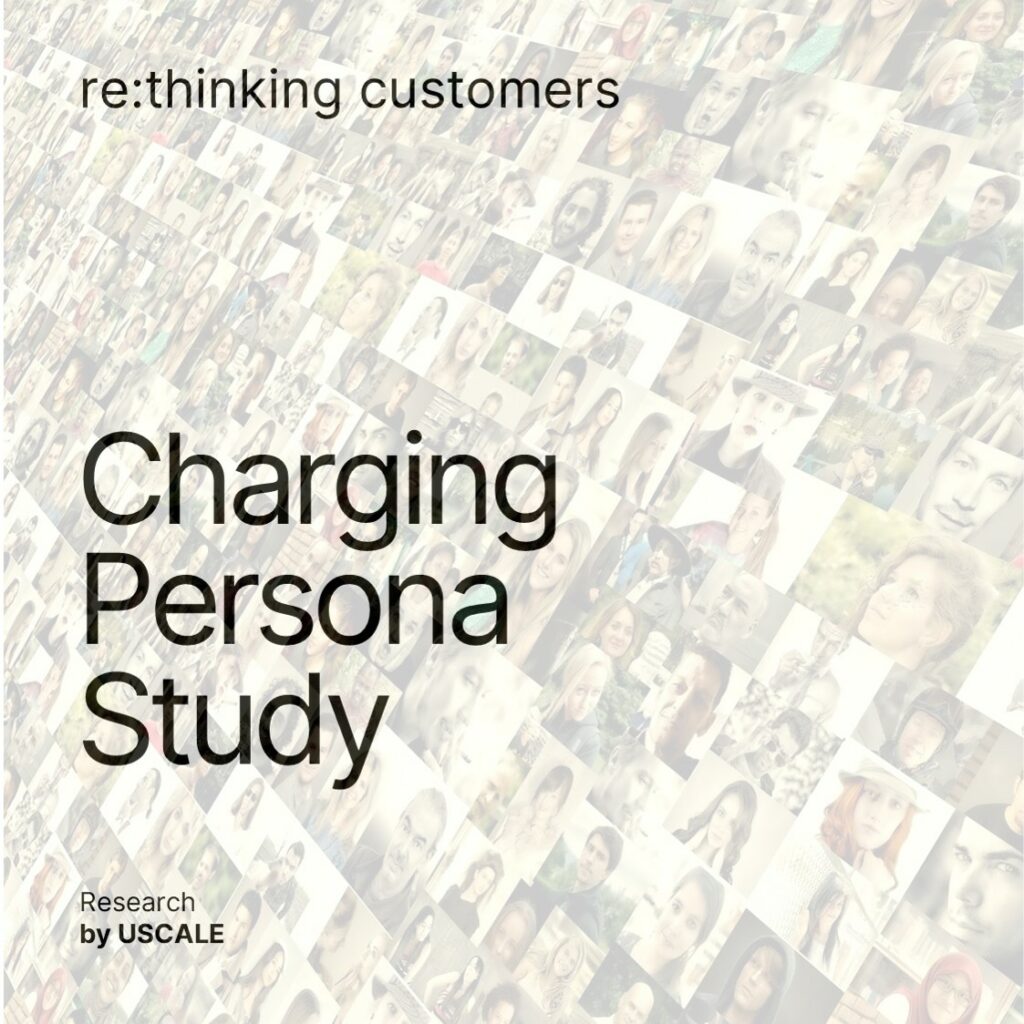Charging Persona Study 2024

Charging personas for the e-Mobility Market
The market share of EVs is increasing. Therefore EV drivers are becoming more diverse. At the same time, competition for charging technology is also increasing. In order to compete successfully, providers need charging personas to segment the market.
The Charging Persona Study provides the first customer segmentation for all stakeholders in the electromobility market.
The study consists of two parts:
- Charging Personas were developed from values, beliefs, attitudes, media behaviour and many more critieria relevant to decribe an individual.
- Charging profiles were determined from driving, living and charging behaviour.
The persona study was conducted online in April 2024 among over 1,200 e-car owners in Germany.
The charging profiles and charging personas identified for the e-mobility eco-system can be transferred, i.e. “mapped”, to all USCALE studies from 2023 onwards. The analysis is therefore not only useful as a stand-alone study, but also expands the entire USCALE focus study spectrum.
A dashboard is offered as an optional add-on to the ppt report. The dashboard not only provides full access to the raw data but also allows subsribers to conduct own analyses of all variables.
Contents and added value of the Charging Persona Study
Contents of the Charging Persona Study
Demographie:
- Age
- Gender
- Net household income
- Level of education
- Employment relationship
- Field of activity
- Place of residence
- Residence
- Car park at the house
- Number of adults and children in the household
Vehicle purchase:
- Motivation for electric cars (technology, driving experience, operating costs, subsidies/taxes, ecological advantages, political reasons, image)
- Typical car usage situations: Commuting to work, daily errands, long distances, etc.
- Type of information (attention to detail vs. trust in third parties)
- Interest in used cars
- Important aspects when buying a vehicle (brand, dealer / workshop nearby, relationship of trust with the dealer, manufacturer’s home country, country of production, sustainability of the company, price / monthly instalment, running costs, space concept, comfort, performance, design, image, digital services, equipment, range, charging power / charging time)
- Attitudes towards the car and charging technology purchase process (Likert matrix with 4 items)
- Maintenance contracts concluded
- Insurance policies taken out
- Type of purchase (cash purchase, financing, leasing, subscription)
- Importance of brands in general
- Preferred payment methods
Mobility-related attitudes:
- Attitudes towards mobility in general (Likert matrix with 6 items on car use, public transport, etc.)
- Attitudes towards the car (Likert matrix with 5 items)
Driving behaviour:
- Number of cars in the household
- Different drive systems of the cars in the household
- Number of people who use cars
- Drive, car brand, segment of the most frequently used car
- Company car
- Mileage per year / per weekday
- Vacation by car
- Means of transport used for commuting to work
- Means of transport used in spare time
Charging behaviour and charging technology:
- Charging locations
- Charging occasions
- Charging frequency
- Charging preferences
- Charging technology at home (wallbox, PV, battery storage, etc.)
Purchase of charging technology:
- Important aspects for buying charging technology (price, design, brand, range of functions, quality, ease of use, customer support, expandability)
- Trust in charging technology providers (car dealers, energy suppliers, electricians, solar installers, heating engineers, charging technology manufacturers, specialised online shops, general online retailers, DIY stores, social media, price comparison portals, product tests, trade journals, friends and acquaintances)
- Where to buy charging technology
Change of electricity supplier:
- Criteria for switching electricity supplier
- Openness for switching electricity supplier
Values and attitudes:
- Values according to S. Schwarz: wealth, success, respect, tradition, conformity, hedoism, stimulation, benevolence, universalism
- Political attitudes towards the economy vs. the environment, security vs. data protection, support for the needy vs. raising taxes
- Innovation-related attitudes (Likert-type question battery with 6 items)
- Technology affinity (Likert-type question battery with 4 questions)
Media use, topics, channels:
- Media use: Newspapers (print / online), radio, TV, streaming services, podcasts, social media
- Social media use: YouTube, Facebook, LinkedIn, Xing, Instagram, Snapchat, Tiktok, Pinterest
- Newspapers: Bild, Die Welt, Der Spiegel, Die Tageszeitung (taz), Die Zeit, Express, Focus, Frankfurter Allgemeine (FAZ), Handelsblatt, Stern, Süddeutsche Zeitung, regional newspaper, trade newspaper
- Car-related trade journals: ADAC motorwelt (print), adac.de, Autobild (print), autobild.de, Auto Motor Sport (print), auto-motor-und-sport.de, electricar (print), electricar-magazin.de, Elektroautomobil (print), elektroautomobil. com, Vision Mobility (print), vision-mobility.de, Arrive.com, eautocity.de, ecomento.de, efahrer.com, electrive.net, elektroauto-news.net, e-mobilio.de, emobility-magazin.com, e-autos.de, goingelectric.de, insideevs.de
- Topic-related interests: Education and knowledge, health and fitness, arts and culture, lifestyle and fashion, news, politics and government, sports, entertainment, business and finance, science and technology
- Preferred communication channels: by phone, by e-mail, by SMS, by letter, personal contact, social media, by contact form, by ChatBot
Target group of the survey
For the study, owners of fully battery-electric e-cars with a wide variety of usage habits were surveyed.
Respondents were recruited via social media and access panels in order to achieve a wide diversity.
Added value and benefits for providers of electric cars, charging technology and charging services
The charging personas for electromobility help not only providers of e-cars and charging technology but also services for charging at home, in (semi-)public spaces and at work.
Furthermore, the study helps manufacturers and providers to understand the important target group segments. This enables providers to both reach their target groups with the right content and the appropriate channels.
You can also find basic information on the topic of market segmentation in the Adobe Experience Cloud.
USCALE focus studies: User studies on electromobility
Since 2018, USCALE has been systematically surveying EV drivers about their expectations and experiences at all touchpoints of the e-mobile customer journey. Additionally, an overview with all USCALE Focus Studies can be found HERE.
We also show extracts from other studies in the LinkedIn articles by USCALE and Axel Sprenger.
If you have any questions, please contact us at contact@uscale.digital.
